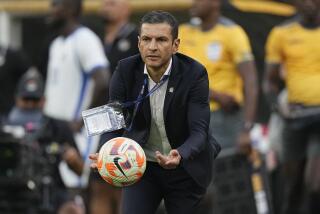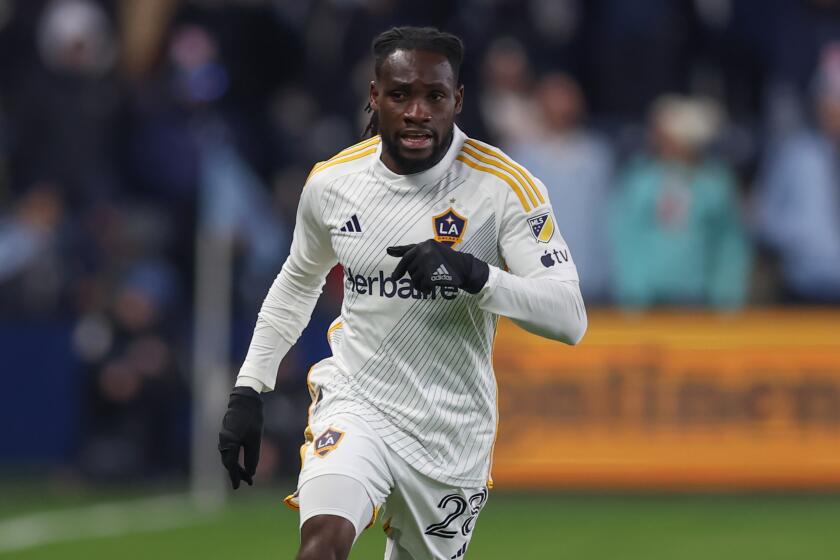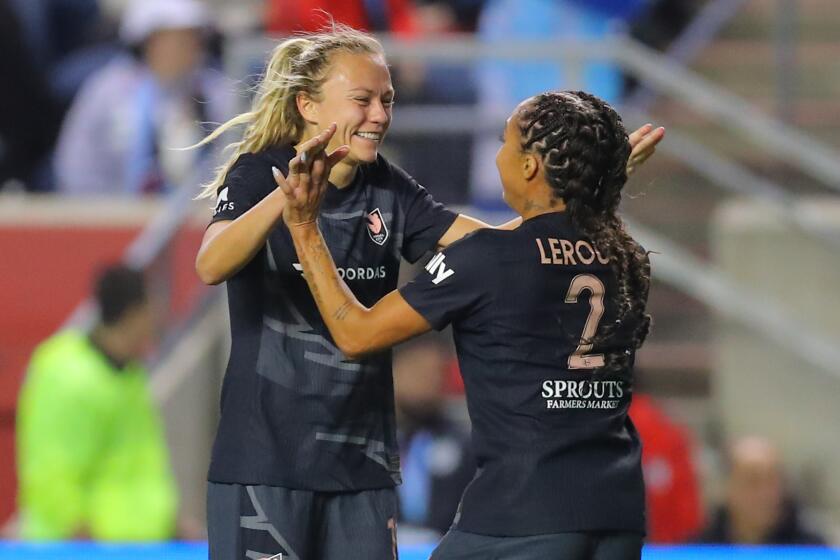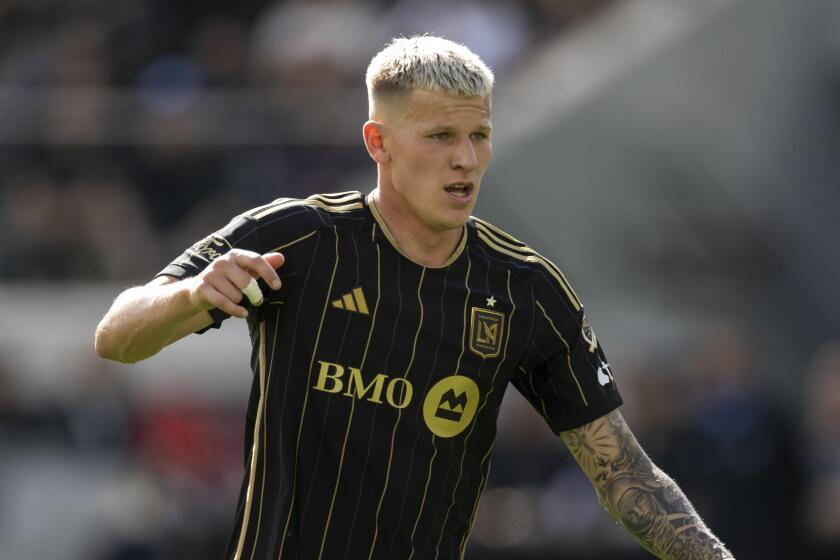Winter training camp kicks off crucial year for U.S. soccer Coach Juergen Klinsmann
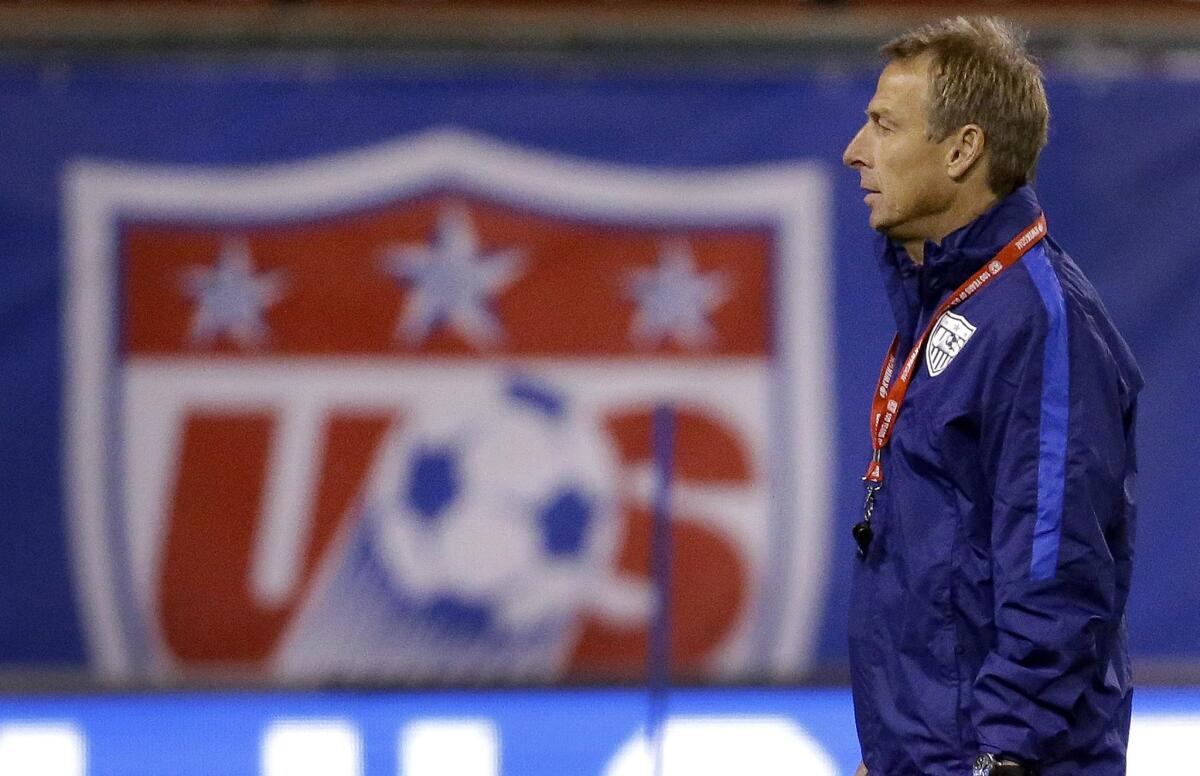
United States men’s national team Coach Juergen Klinsmann watches his team warm up during practice Nov. 12.
Juergen Klinsmann has held a January training camp in each of his four winters as coach of the U.S. soccer team. In many ways, the 26-day camp that opened last week at the StubHub Center will be little different from the three that preceded it.
“In terms of training, everything, usually January camps are pretty much the same,” he said.
In other ways, however, the next three weeks could be among the most critical of Klinsmann’s tenure with the national team. After a difficult 2015 — in which the U.S. failed to reach the Gold Cup final for the first time in 12 years, then missed a chance to play in the Confederations Cup by losing a playoff to Mexico — Klinsmann heads into a 2016 crowded with two rounds of World Cup qualifying, a two-leg play-in with Colombia for the final berth in the Olympics and the prestigious Copa America, which is being played in the U.S. for the first time.
After ending the old year facing questions about his future, Klinsmann enters the new one needing positive results to chase that cloud of doubt away.
“Expectations and the pressure on the coach, it’s always there. I have no problem with that,” Klinsmann said. “I’m realistic. I know what you can achieve and what is very, very impossible to achieve.
“And maybe sometimes I’m a bit too straightforward mentioning those things.”
Klinsmann, the first non-American to coach the national team since 1995, was hired in 2011 to internationalize U.S. Soccer, though not everyone has bought into his road map for change. That has led to frequent skirmishes with current and former players, Major League Soccer and others over everything from the long domestic offseason to a woefully inadequate youth development system and lack of a soccer culture in this country.
It has won him few friends, but as Klinsmann said last fall, “I’m not here to be liked.”
He does have important supporters, however, including U.S. Soccer Federation President Sunil Gulati, the man who hired him and then extended his contract, making Klinsmann technical director for all men’s national team programs as well.
The recently retired Eddie Johnson, cut from the national team by Klinsmann, joined that chorus last weekend.
“His philosophy and his understanding of the game, it’s important for our national team,” Johnson told the SB Nation website. “I think our fans need to be a little more patient with what he’s trying to build here in our country.”
While Klinsmann has made headway in some areas — U.S. Soccer this year will add an Under-12 academy to its youth development program — he’s still facing pushback in efforts to implement his vision. For instance, this winter’s camp, which will end with friendlies against Iceland and Canada, was shortened after a group of veteran players complained about Klinsmann’s plan to devote a full week to fitness.
“When people say, ‘Can you start the camp a little bit later?’ ... no problem,” the coach said. “But then you just need to be in your expectations realistic.
“I think one problem is a lot of people don’t know what our work looks like. …There’s still a lot of education to be done. And I didn’t mean it saying people don’t know what they’re talking about. That’s not my point. What I meant with it, for the global soccer market, that’s where a lot of people don’t understand when [I] talk fixture dates, when [I] talk different stages of the year, when [I] talk different kinds of rosters. What does it really mean?”
Klinsmann means to accomplish two goals with the team he called into this winter’s camp. With 11 of the players age-eligible for the Olympics, a U-23 tournament, the January training sessions are accelerating preparations for the March playoffs with Colombia — a two-leg series the U.S. must win to make good on Klinsmann’s promise of qualifying for the Rio de Janeiro Games.
He’s also beginning the necessary process of making the senior team younger since nine of the 11 players Klinsmann started against Mexico in October will be older than 30 by the time the next World Cup kicks off.
“Do we need to get a bit younger? Yeah. Do we need to find more talent, develop more talent? Yeah,” he said. “There’s still a long way to go in order to one day be in the top 10, top 15 in the world.
“But it will slowly improve. It will get better.”
Patience, though, may not be a virtue that Klinsmann can afford. Because while he’s making the senior team younger, he also has to make it better in time for March’s World Cup qualifiers against Guatemala and June’s Copa America, which will feature four of the world’s top eight teams.
And if he stumbles, he can only expect the criticism of his methods and the calls for his ouster to grow louder.



